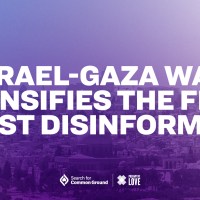On Saturday, as news of an escalation in the Israel-Gaza war broke, social media platforms became the go-to source for real-time updates. Unfortunately, alongside these updates came a deluge of disinformation and misinformation; viral videos taken out of context and manipulated, stories without verification, and offline violence being fueled by online actions, a troubling trend often witnessed in emotionally charged conflicts where reliable information is scarce.
For instance, a video depicting an alleged Hamas soldier shooting down an Israeli helicopter turned out to be a clip from the video game Arma 3. One fake document, which was widely shared on X (formerly Twitter), falsely stated that the American president Joe Biden had approved $8 billion in emergency aid for Israel. Shockingly, some of these misleading messages garnered thousands of shares and likes.
Let’s take a moment to reflect on the early years of the internet and social media which promised us boundless connectivity and global outreach. In reality, these platforms have often exacerbated existing divisions, perpetuating the “us” versus “them” narrative and reinforcing the belief in subjective truths. This issue is now glaringly evident in the Middle East, where a deeply entrenched political conflict carries far-reaching global implications. This conflict is growing increasingly complex, and online, we witness the amplification of the loudest and most extreme voices. Such voices and communication also have an influence on policy decisions concerning conflicts, regarding information and public opinion.
At Search for Common Ground, an NGO with decades of experience in peacebuilding across more than 30 countries, we strive to mitigate aggression and conflict even in digital spaces. Our extensive experience has taught us that online hatred, dehumanization, and polarization eventually spills over into the real world, escalating the risk of further violence.The war in Israel-Gaza underscores the urgency of this issue. It is imperative that all parties involved shift their complete focus towards achieving an immediate ceasefire and ensuring the protection of all civilians, both in the digital realm and the real world.
In recent months, there have been efforts in the tech industry to create a safer online environment. A global movement of accountability is growing as a result of the European Commission’s leadership to hold large platforms accountable for the societal harm they cause. The Digital Service Act (DSA) for instance, provides better protection for citizens and ensures that tech platforms are held accountable for the risks they pose to social cohesion. Earlier this week, Thierry Breton, EU industry chief, told Elon Musk (CEO of X) to tackle the spread of disinformation on his platform and invited him “to urgently ensure that your systems are effective and report on the crisis measures taken to my team.”
So accountability is clearly gaining momentum with major tech companies like Meta, YouTube, X, and TikTok already facing scrutiny following the release of an EU report that highlighted their shortcomings in countering a massive Kremlin disinformation campaign related to Russia’s invasion of Ukraine. However, it’s increasingly evident that not enough has been learned from these mistakes.
The ongoing conflict in the Middle East serves as a stark reminder that swift and substantial efforts are essential. Journalists and researchers are overwhelmed with the arduous task of fact-checking the flood of reports about the conflict, which often feels like a mere drop in the ocean. What’s truly needed is a comprehensive, systemic solution.
The coming years represent a pivotal moment during which we can shape how today’s social technologies either imperil or safeguard lives and influence the design and regulation of tomorrow’s social technologies. It’s time to move beyond merely mitigating harm and instead adopt an integrated approach that fosters a tech ecosystem that, among other things, promotes peace, preventing existing tensions from escalating. To achieve this, it’s imperative to bring together various stakeholders: tech giants, policymakers, experts, civil society organizations, and peacebuilders, each contributing their unique expertise. Additionally, the experiences of internet users from conflict zones and the Global South should take center stage, perspectives that have been largely absent from technology sector debates and decision-making, including at EU level. It’s evident that addressing the challenge of online polarization and enhancing digital literacy are crucial. Many individuals tend to disengage when online conversations become increasingly polarized, making training and education essential to equip people with the skills to navigate these issues effectively.
And in the meantime, what steps can I take as a news consumer? What can I do to help?
Widespread circulation is not a guarantee of the truth, but only of the degrees of emotions it arouses. Identifying fake news does not always have to be a complex task. A healthy dose of skepticism is the first line of defense when evaluating information. Always approach news with doubt unless it is from a reliable source. Be wary of news stories that start with phrases like “you won’t hear about this in the media” or “they just announced it on TV” without providing supporting evidence. The creators of these false narratives come from a range of sources, from anonymous accounts to prominent media and political figures. Their motivations can vary widely, from seeking power or political positions to simply wanting validation and attention. This misinformation can perpetuate a cycle of falsehoods, sensationalism, and violence.
In the face of the Israel-Gaza war and the surge of misinformation online, it’s evident that swift, collaborative efforts are essential to safeguard the digital realm and promote peace in the real world. As we navigate the evolving landscape of social technologies, we must strive for a future where connectivity fosters understanding and unity, rather than division and violence.
This op-ed, written by Charline Burton, executive director, Search for Common Ground, Belgium, first appeared in the Dutch-language newspaper, De Tijd.
To Help Prevent Further Violence in the Middle East, Support Our Middle East Emergency Fund.


